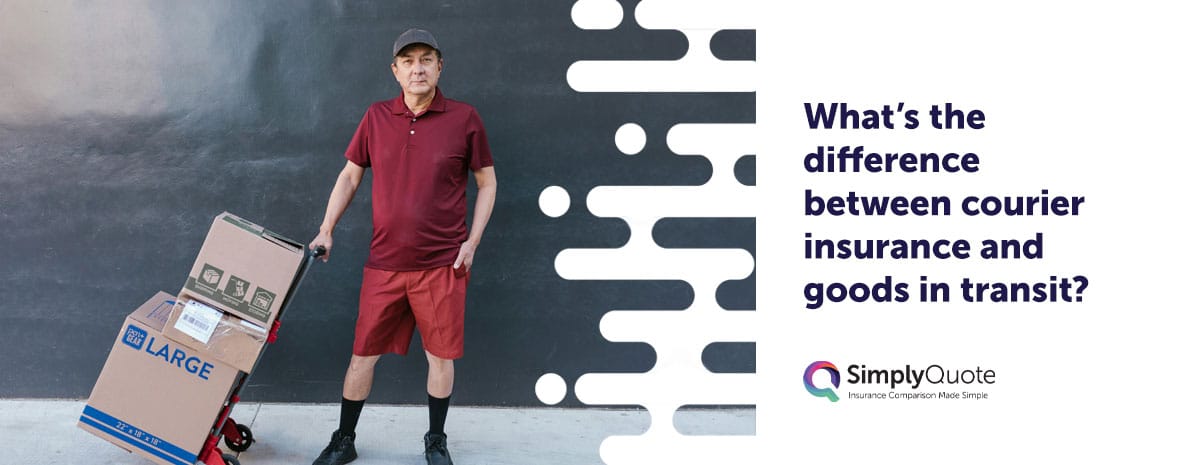What’s the difference between courier insurance and goods in transit?
Courier insurance covers the vehicle and driver for carrying goods commercially, while goods in transit insurance covers the actual items being delivered against loss, theft, or damage.
They serve different purposes, and in most cases, couriers need both.
Here’s the simplest way to think about it: courier insurance protects you, goods in transit protects the cargo. If you’re driving a van for Amazon Flex, Evri, or as a self-employed courier, courier insurance is your legal licence to operate. But it doesn’t cover the laptop, sofa, or pallet of tools you’re transporting. That’s what goods in transit is for.
They’re often bundled together, which causes confusion. Some drivers believe goods in transit is “included” in courier insurance—but in reality, it’s usually an optional extra or a separate product entirely.
In this guide, we’ll break down what each type of cover does, who needs both, and why the differences matter. Because if you’re relying on one without understanding the other, you could be left exposed the moment something goes wrong on the job.

What does courier Insurance cover that goods in transit doesn’t?
Courier insurance covers the vehicle, driver, and liability risks involved in delivery work—things goods in transit insurance doesn’t touch.
It’s the base layer that makes you legal to operate as a courier.
Here’s what courier insurance typically includes that goods in transit doesn’t:
- Hire and Reward Cover – This is the legal core of courier insurance. It allows you to carry goods in exchange for payment. Without it, you’re technically uninsured—even if you have goods in transit cover.
- Vehicle Insurance – Covers damage to your own van or car in the event of an accident. Goods in transit only protects what’s inside the vehicle, not the vehicle itself.
- Public Liability Insurance (often included or bundled) – Covers injury to third parties or damage to property during pickups or deliveries—think scratched flooring, broken gates, or someone tripping over a parcel.
- Legal Expenses Cover – Covers solicitor fees if you’re involved in a legal dispute—whether it’s a claim against you or one you need to make.
- Breakdown Cover (optional add-on) – Some courier policies include breakdown recovery designed for delivery vehicles, including onward delivery support.
Goods in transit insurance might pay out if a parcel goes missing—but it won’t help if your van is written off, you damage someone’s property, or you’re involved in a legal dispute.
Courier insurance makes sure you’re road-legal, operational, and protected against delivery-related liability. Goods in transit is valuable—but without courier cover, it’s like wearing shin pads with no boots.
Looking to compare courier insurance? Get your quote today!
Get QuotesWhat does goods in transit insurance cover?
Goods in transit insurance covers the items you’re carrying while they’re in your vehicle—from theft, loss, or damage during transit, loading, or unloading.
It’s there to protect the value of what you’re delivering—not the vehicle, not you.
If a parcel goes missing, gets stolen from your van, or is damaged while being delivered, goods in transit insurance helps cover the cost of compensation. It’s especially useful for couriers delivering expensive, fragile, or irreplaceable goods.
Here’s what’s typically covered:
- Accidental Damage: If you drop or mishandle an item during delivery, this cover may pay out—depending on the policy limits and exclusions.
- Theft from the Vehicle: If your vehicle is broken into and the goods are stolen, you’re covered—provided there’s evidence of forced entry and you’ve complied with policy security conditions.
- Loss or Non-Delivery: If an item goes missing during transit or fails to reach its intended recipient, the policy can help with the cost of replacing or compensating for it.
- Damage During Loading/Unloading: Policies often extend to moments when the goods are being handled—lifting a parcel into the van or carrying it up to a property.
Most goods in transit policies are tailored to the type of courier work you do. For example, if you’re delivering high-value electronics or working in same-day logistics, your insurer may ask for extra security features, overnight storage terms, or specific vehicle tracking.
Without this cover, any damage or loss becomes your financial responsibility. And in a job where parcels can be worth hundreds or even thousands of pounds, that’s a risk most drivers shouldn’t carry alone.
Do I need both courier insurance and goods in transit?
Yes—if you’re delivering goods for payment, you almost always need both courier insurance and goods in transit cover.
One protects your legal and vehicle liability; the other protects the cargo. Without both, you’re leaving major gaps in your protection.
Courier insurance makes you road legal. It ensures you’re insured to use your vehicle for hire and reward—the minimum requirement for delivering goods commercially. It also typically includes vehicle cover, and sometimes extras like public liability or breakdown assistance.
But it stops at the van doors.
That’s where goods in transit comes in. If a customer’s parcel is lost, damaged, or stolen, courier insurance won’t help you. You’d be personally liable for the cost, and possibly for damage to your reputation if you’re working for a platform like Amazon Flex, Evri, or a logistics firm with service-level agreements.
Here’s who absolutely needs both:
- Self-employed delivery drivers
- Courier companies (even small fleets)
- Gig economy workers on food or parcel platforms
- Anyone transporting goods of value on behalf of clients
Having both isn’t overkill—it’s standard practice. Most comprehensive courier policies bundle goods in transit as an add-on or offer it as a required extra. If it’s not included, it’s still your responsibility to ensure it’s in place.
Can I work without goods in transit insurance?
You can technically work without goods in transit insurance—but doing so means taking full financial responsibility if anything happens to the items you’re delivering.
It’s not illegal, but it’s often risky, and some platforms or clients won’t allow it.
If you’re delivering low-value items, or you’re contracted through a platform that provides this cover on your behalf (which is rare), you might not be required to have your own goods in transit policy. But for most self-employed drivers, this protection is crucial.
Without goods in transit, you’re exposed to:
- Theft – If your van is broken into, you’ll be on the hook for the cost of stolen goods.
- Loss or mis-delivery – A parcel left in the wrong place, or that disappears in transit, becomes your responsibility.
- Damage – If a package is dropped, crushed, or rained on and arrives in poor condition, the compensation comes out of your pocket.
Some courier firms or aggregator platforms (like Amazon Logistics or delivery sub-contractors) may insist on goods in transit insurance before offering you work. Others won’t check—until something goes wrong and a claim lands squarely on your desk.
How much more does goods in transit insurance cost?
Goods in transit insurance usually adds around £100 to £250 per year to your courier insurance policy, depending on what you’re delivering and how much cover you need.
For most drivers, it’s a relatively small increase that can prevent massive financial loss.
Some insurers bundle it as part of a broader courier package—particularly for sole traders and gig workers—while others offer it as a standalone product or add-on. The key price factors include:
- Type of Goods – High-value or fragile items (e.g. electronics, medical supplies) will increase the premium. Food delivery and retail parcels are generally lower risk.
- Cover Level – Policies often start at £5,000 or £10,000 of cover. The higher the limit, the higher the premium.
- Delivery Area & Volume – Urban couriers covering more miles or doing more drops per day may face slightly higher premiums due to higher risk exposure.
- Storage and Security Measures – If your van is alarmed or parked securely overnight, you may get a better rate.
Here’s a typical pricing breakdown:
| Cover Type | Approx. Annual Cost |
|---|---|
| Courier Insurance (base) | £1,000 – £2,000 |
| Goods in Transit (add-on) | £100 – £250 |
| Combined Policy | £1,100 – £2,200 |
Compared to the cost of replacing a van load of lost parcels—or losing a key client over a damaged delivery—goods in transit cover is an inexpensive layer of financial security.
Final thoughts
Courier insurance and goods in transit insurance aren’t the same—and if you’re delivering for money, understanding that difference matters. One covers your vehicle, your legal status, and your liability as a driver. The other protects the goods you’re trusted to carry.
Skipping either creates risk. Without courier insurance, you’re not even legal to drive for hire. Without goods in transit, you’re liable for the parcels in your care—sometimes worth thousands of pounds—if they’re lost, damaged, or stolen.
They complement each other. One keeps your wheels on the road, the other protects what you’re delivering. And if you’re working in a fast-moving, trust-sensitive industry like courier logistics, that protection isn’t optional—it’s foundational.
So if you’re choosing cover, don’t ask which one to get. Ask how much risk you’re willing to carry alone. Most experienced drivers already know the answer: get both, and protect the job you’ve worked hard to build.
Frequently Asked Questions (FAQs)
Not always. Some courier policies bundle goods in transit as an add-on, but many offer it separately. You need to check the policy details carefully.
Yes. Courier insurance covers the vehicle and driver; goods in transit covers the items being delivered. One doesn’t replace the other.
No. You’ll need goods in transit cover to claim for stolen, lost, or damaged goods. Courier insurance doesn’t cover the cargo.
Yes—if your policy includes theft and security conditions are met (e.g., forced entry). Always check exclusions and storage requirements.
No—but it’s often required by platforms or clients, and strongly recommended if you carry goods professionally. You’re liable without it.
Yes. Many insurers offer it as a standalone policy or as an add-on to courier insurance, especially for self-employed drivers.
Yes—many platforms expect you to have it, even if they don’t always check upfront. Lack of cover may lead to claim issues later.
You’ll have to pay out-of-pocket for any items lost, damaged, or stolen while in your care. That risk can cost more than the premium.
